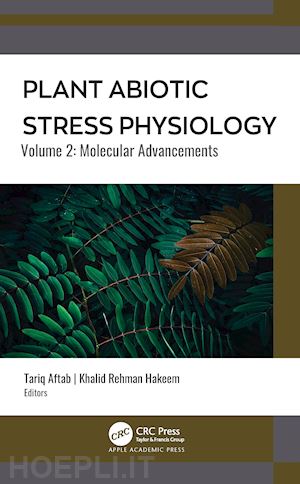1.Plant-Environment Interaction in Developing Crop Species Resilient to Climate ChangeSubhash, Indu, Jyoti Chauhan, Basant Kumar, Vivek Kumar, Prjjal Dey, Udit Nandan Mishra, Chandrasekhar Sahu, and Rajesh Kumar Singhal2.Genomics Approaches to Study Abiotic Stress Tolerance in PlantsAhmed H. El-Sappah, M. M. Islam, and Shabir A. Rather3.Role of Phenomics in Screening Abiotic Stress Tolerance in PlantsAditya Banerjee and Aryadeep Roychoudhury4.Genetic Regulation, Biosynthesis, and the Roles of Osmoprotective Compounds in Abiotic Stress Tolerance in PlantsAkbar Hossain, Md. Abu Syedb, Sagar Maitrac, Sourav Garaid; Mousumi Mondale, Md. Babul Akterf, Muzahid E Rahmana, Md. Nur Alama, Mst. Tanjina Islamg, Milan Skalickyh, I. Marian Brestich, and Tofazzal Hossainj5.Plant Growth Regulators and Their Interaction with Abiotic Stress FactorsLubna Tariq, Basharat Ahmad Bhat, Syed Suhail Hamdani, Showkat Nissar, Bashir Ahmad Sheikh, Manzoor Ahmad Dar, Safiya Mehraj, and Tanvir Ul Hasan Dar6.Role of Abscisic Acid in Abiotic Stress Condition and Its ManagementMuhammad Muzammal Aslam, Muhammad Ashar Ayub, Zahoor Ahmad, Rana Muhammad Sabir Tariq, Zia Ur Rahman Farooqi, Muhammad Naveed Arshad, and Faiz Ur Rehman7.Management of Abiotic Stress Conditions by Salicylic AcidRana Muhammad Sabir Tariq, Tanveer Ahmad, Muhammad Ashar Ayub, Waqas Ahmad Dogar, Zahoor Ahmad, and Muhammad Muzammal Aslam8.Ethylene Signaling During Leaf SenescenceSabeera Muzzaffar, Sajad A. Rather, and F. A. Masoodi9.Role of in Mitigating Plant Stress and Its Interaction with Salicylic AcidBasharat Ahmad Bhat, Lubna Tariq, Showkat Nissar, Syed Suhail Hamdani, Manzoor Ahmad Dar, Safiya Mehraj, and Tanvir Ul Hasan Dar10.Harnessing the CRISPR/CAS System for Resistance Against Abiotic Stresses in Rice: Recent Advances, Applications, Challenges, and ProspectsShakeel Ahmad, Amina Nisar, Shakra Jamil, Rahil Shahzad, Zhonghua Sheng, Muhammad Munir Iqbal, Chen Wei, Shikai Hu, Luo Ju, Xiangjin Wei, Peisong Hu, and Shaoqing Tang11.Emerging Roles of Osmoprotectants in the Abiotic Stress Tolerance of PlantsJeet Ram Choudhary, Showkat Ahmad Ganie, Monika Bansal, Bhavna Goswami, Anita Burdak, Sonu Get, Anurag Tripathi, and Shabir Hussain Wani












